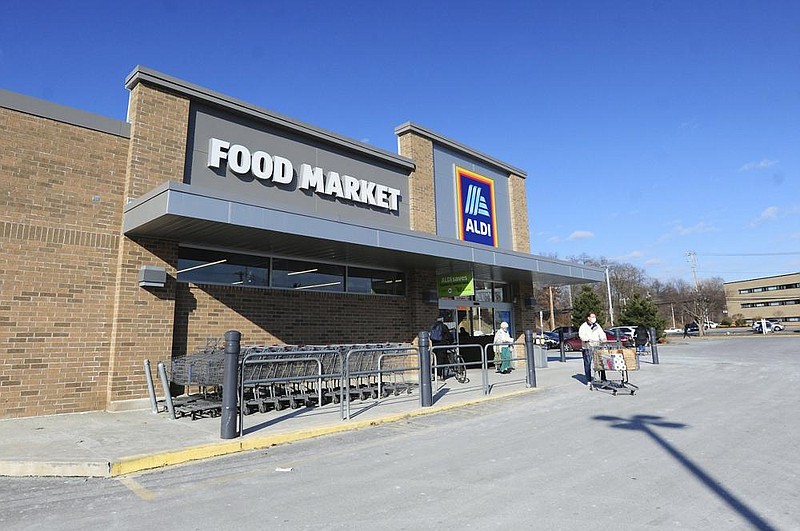A number of leading grocery chains are offering small cash bonuses and other incentives to encourage employees to get the coronavirus vaccine, in an effort that experts say could help speed protection of some of the country's most vulnerable workers: low-paid, hourly retail workers.
Dollar General, Trader Joe's, Aldi and Lidl, as well as Instacart, have announced plans to promote the vaccine among employees, including flexible work schedules, paid time off to visit a vaccination site and bonuses of up to $200.
The restaurant industry may also be moving toward incentives. On Tuesday, Darden Restaurants, which employs more than 175,000 workers across Olive Garden, LongHorn Steakhouse and many more brands, said it would offer up to four hours of paid time off to get the vaccine.
However, few other companies have followed suit, potentially in part because of legal uncertainties involved with health screening questionnaires leading up to vaccination.
[CORONAVIRUS: Click here for our complete coverage » arkansasonline.com/coronavirus]
Yogurt-maker Chobani is one of the few food processors to announce a vaccine incentive. The company is offering its 2,200 workers up to six hours of paid time off to get inoculated (three hours for each dose received). President and Chief Operating Officer Peter McGuinness said the company hoped to inspire others to follow.
"The more people are vaccinated, the faster this pandemic goes away," McGuinness said. "Government can't do it alone, NGOs [non-governmental organizations] can't do it alone and businesses can't do it alone, but if we all collaborate together ... we can make a real difference on this. I hope more of the private sector really steps up."
Grocery workers have remained vulnerable on the front lines as hazard pay expires, customers flout safety guidelines and the virus rages on. As of early January, at least 124 grocery workers had died of covid-19 since the pandemic started, according to the United Food and Commercial Workers International Union. More than 25,700 workers had been exposed to a positive case.
WORKERS' OBSTACLES
Employers characterized the incentives as a way to limit obstacles to getting vaccinated, such as costs of transit, child care and missed time on the job. The average grocery stock clerk makes about $11.31 an hour in base pay, according to PayScale.com.
"Nine times out of 10, the biggest factor is, 'Oh, I can't afford to take off of work' or 'Oh, I have no one to watch my child' or 'Oh, I can't get there,'" said Lauren Rzeplinski, a 28-year-old store supervisor at Lidl in Lake Grove, N.Y. "The [incentive] will really help people where these are their only issues with getting the vaccine."
Unlike workers at large manufacturing plants or other centralized operations, retail workers are more dispersed, making access to clinics more challenging.
"It's practical to lower the barriers to front-line workers who are leaving their places of employment and getting vaccinated," said Molly Kinder, a fellow at the Brookings Institution who studies front-line workers. "They need these workarounds."
Lidl, which is offering $200 in additional pay and schedule flexibility to employees who get the vaccine, said that 8 out of 10 workers in an internal survey said they'd get the vaccine as soon as it was available. If all its 6,000 U.S. employees got the vaccine, the cost would total about $2 million, said Will Harwood, Lidl's director of communications.
Employment lawyers think legal questions may be keeping other companies on the sidelines. Potential screening questions when someone gets vaccinated about allergies or being immuno-compromised could implicate the Americans With Disabilities Act, lawyers said. Those questions are allowed if they are considered "job related and consistent with business necessity" or if they're part of a "voluntary wellness program," legal experts say.
Some lawyers believe companies will be able to successfully argue that the required screening questions for the coronavirus vaccine meet the standard of being needed for the business.
OTHER STRATEGIES
Some employers are devising other ways to encourage vaccinations. Matrix Medical Network, which provides "mobile health clinics" -- RV-style vehicles outfitted with medical supplies and staff -- will bring the vaccine directly to employees. Tyson Foods is partnering with Matrix to offer the mobile health clinics and vaccine to workers. "A lot of the organizations we're working with are not making people punch out to get the vaccine," said Daniel Castillo, chief medical officer at Matrix.
Walmart, meanwhile, which recently increased the number of states where it will provide inoculations, does not plan to offer employee incentives at this time but will make them "free and accessible" to its 1.5 million U.S. workers, spokesman Randy Hargrove said in an email. It is, however, adding three days of paid leave for employees who experience vaccine side effects.
Walmart Chief Executive Officer Doug McMillon, speaking in a Business Roundtable media call with reporters Jan. 19, said that on a recent store visit in Alabama, the "number one question" employees had was about whether Walmart planned to mandate the vaccine. "Our role is to encourage it and to communicate facts, and to set an example and hopefully have a very high take rate, because it's important, obviously, that that happen," he said. "I don't think very many companies will take the step of mandating."

